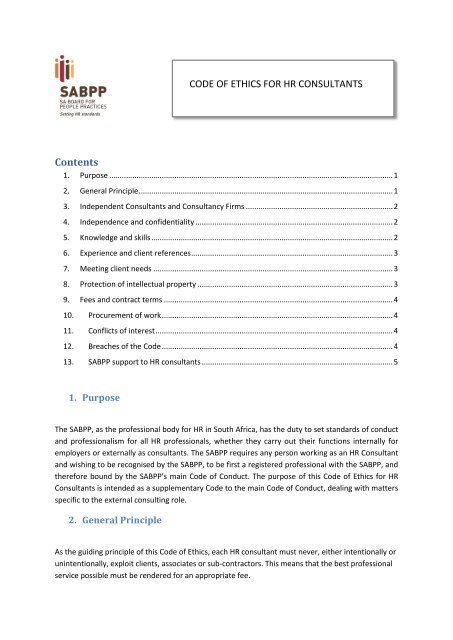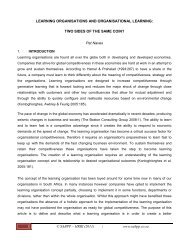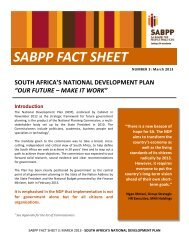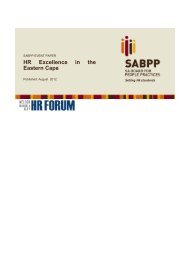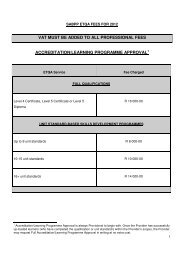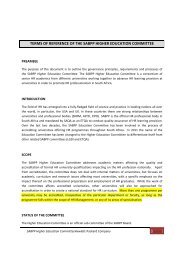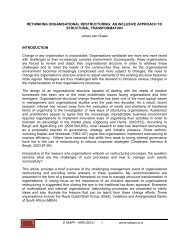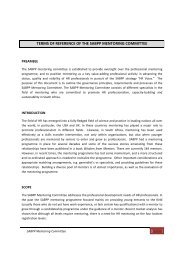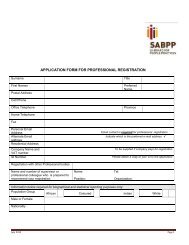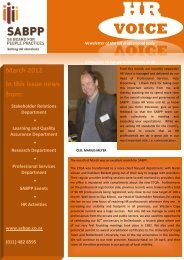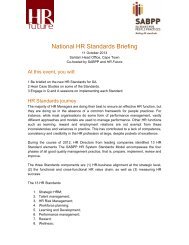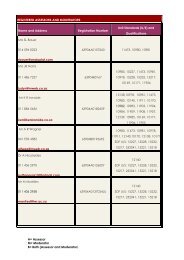Code of Ethics for HR Consultants.pdf - SABPP
Code of Ethics for HR Consultants.pdf - SABPP
Code of Ethics for HR Consultants.pdf - SABPP
- No tags were found...
Create successful ePaper yourself
Turn your PDF publications into a flip-book with our unique Google optimized e-Paper software.
consulting through reading, on-line discussions and attendance at <strong>Ethics</strong> workshops. Personaljournaling and pr<strong>of</strong>essional supervision are also developmental methods that are encouraged <strong>for</strong> <strong>HR</strong>consultants.6. Experience and client referencesEach <strong>HR</strong> consultant must maintain an up to date portfolio <strong>of</strong> consulting projects completed,specifying the purpose <strong>of</strong> the assignment, the length <strong>of</strong> the assignment (in full time equivalence) andthe results achieved. This portfolio, with anonymity <strong>of</strong> clients if so requested by the client, must bemade available <strong>for</strong> perusal by any potential client.The portfolio should indicate actual work done by the consultant and should clearly indicate thoseparts <strong>of</strong> the work that were carried out by associates or sub-contractors.The <strong>HR</strong> consultant should make reasonable ef<strong>for</strong>ts to procure client references that can be providedto potential future clients, in such a <strong>for</strong>m that the potential client can verify those references. Thislist should not be inflated by including very small projects or similar minor relationships.7. Meeting client needsThe <strong>HR</strong> consultant should, first and <strong>for</strong>emost, seek to understand the presented and underlyingneeds <strong>of</strong> the client be<strong>for</strong>e proposing a scheme <strong>of</strong> work. <strong>HR</strong> consultants should not, in general,present standard models <strong>of</strong> interventions, but should tailor their proposals to the needs <strong>of</strong> theclient.Where a standard service is provided using copyrighted tools, <strong>for</strong> example, in psychometricassessments, the <strong>HR</strong> consultant must (a) warrant that he or she is qualified and licensed to use thosetools and (b) ensure that the tools used are appropriate to the client’s needs.Proposals should always state in measurable terms the outcomes to be achieved and such outcomesshould be within the capacity <strong>of</strong> the <strong>HR</strong> consultant to achieve.8. Protection <strong>of</strong> intellectual propertyGiven the general availability through the Internet and other such sources <strong>of</strong> most <strong>of</strong> the intellectualproperty in the <strong>HR</strong> field, <strong>HR</strong> consultants should not seek to restrict the rights <strong>of</strong> their clients to theuse <strong>of</strong> intellectual property provided during the consulting assignment unless significant, personalinvestment in unique intellectual property can be demonstrated. <strong>HR</strong> consulting should add valuebased on the provision <strong>of</strong> wisdom and pr<strong>of</strong>essional judgement acquired through relevant experienceand training.In many cases, <strong>HR</strong> consulting work takes the <strong>for</strong>m <strong>of</strong> external provision <strong>of</strong> a service using clienttechnology, procedures and systems. In such cases, the <strong>HR</strong> consultant must protect the client’sintellectual property rights and should, where appropriate, sign non-disclosure agreements.
9. Fees and contract termsThe basis <strong>for</strong> fees charged should be made clear in the proposal to clients. Additional fees shouldonly be charged in terms <strong>of</strong> an amendment to the contract, agreed with the client and reduced towriting.Whilst there is no recommended scale <strong>of</strong> fees <strong>for</strong> <strong>HR</strong> consultants, fees charged should bebenchmarked appropriately by consultants themselves.The <strong>SABPP</strong> will support <strong>HR</strong> consultants who operate as small businesses and state as their terms <strong>of</strong>contract that payment <strong>for</strong> services rendered must be made within 30 days <strong>of</strong> submission <strong>of</strong> theinvoice.Any other arrangements including but not limited to reimbursement <strong>for</strong> travel, hours to be worked,and places to carry out the service must be agreed upon up front with the client and recorded in thecontract, or recorded in writing in agreement with the client if the need arises during the course <strong>of</strong>the contract.10. Procurement <strong>of</strong> work<strong>HR</strong> consultants should never make any payments to any party to secure work. The only exception tothis rule is the payment <strong>of</strong> the limited amount requested as a deposit <strong>for</strong> certain tender documents,as advertised in the public request to tender.<strong>HR</strong> consultants should not lobby or use inappropriate influence to secure tenders or contracts.Where <strong>HR</strong> consultants bring in other associates or refer other consultants <strong>for</strong> work, or obtain workthrough such referrals themselves, a reasonable finder’s fee or commission may be paid, although itis considered preferable to refer associates based on the known quality <strong>of</strong> their work, and not on thefinder’s fee or commission.11. Conflicts <strong>of</strong> interestAn <strong>HR</strong> consultant should always declare any interest he or she has in the client’s business orbusiness competitors. Any relationship to an employee <strong>of</strong> the client or the client’s competitorsshould be revealed either be<strong>for</strong>e signing the contract, or if the relationship arises afterwards, assoon as practicably possible.Any business or personal connection or interest that the <strong>HR</strong> consultant may have in products orservices to be rendered to the client in terms <strong>of</strong> the contract must be disclosed to the client.12. Breaches <strong>of</strong> the <strong>Code</strong> <strong>of</strong> <strong>Ethics</strong>Where a client or a second consultant believes that an <strong>HR</strong> consultant registered with the <strong>SABPP</strong> hasbreached any term <strong>of</strong> this <strong>Code</strong>, the client should in the first instance raise the concern with the <strong>HR</strong>
consultant directly. If the matter cannot be resolved to the client’s satisfaction, the client mayapproach the <strong>Ethics</strong> Committee <strong>of</strong> the <strong>SABPP</strong> with a complaint, by emailing ethics@sabpp.co.za orby following the process outlined in the Policy and Procedure <strong>for</strong> Hearing Complaints, which isavailable as a download on the <strong>SABPP</strong> website http://www.sabpp.co.za/pr<strong>of</strong>essional-code-<strong>of</strong>ethics/the-sabpp-code-<strong>of</strong>-ethics/.In any further steps that the <strong>SABPP</strong> may take in dealing with the complaint, the <strong>HR</strong> consultant who isthe subject <strong>of</strong> the complaint has the right to know and understand the complaint and to be given theright <strong>of</strong> response.13. <strong>SABPP</strong> support to <strong>HR</strong> consultantsThe <strong>SABPP</strong> <strong>Ethics</strong> Helpline is available to registered <strong>HR</strong> consultants to share ethical concerns andchallenges and to obtain advice on how to resolve ethical problems.


